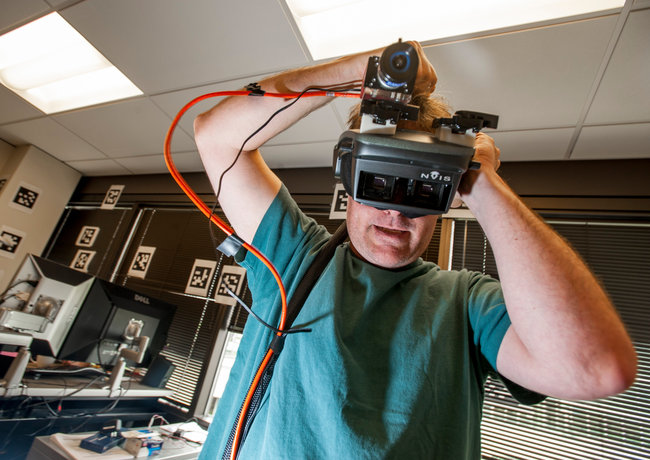Everyone’s talking about the how the Xbox 720 and the Playstation 4, with their increased power and better graphics, will be the next phase of gaming. But if you think about, it’s still basically the same thing — you in a chair, with your Mountain Dew and Cheetos, maybe a headset for screaming at all those noobs, a vibrating controller in hand and a widescreen TV for the “realistic graphics.” Aren’t you craving for a totally different experience?
Well, it looks like the guys at Valve are and their next potential product may just change revolutionize how we play our games.
Valve, the guys behind the massively successful Half Life series and the popular Steam service, has been busy working on what they think could be the next big thing: wearable computing. Valve recently demoed one of their prototype headset and was featured in a New York Times article. Here’s how Times writer Nick Wingfield described it:
“Every way I look, the scene shifts, the battle unfolds. I have a crazy contraption strapped to my head: a boxy set of goggles that looks like a 22nd-century version of a View-Master. It immerses me in a virtual world. I whirl one way and see zombies preparing to snack on my flesh. I turn another and wonder what fresh hell awaits.”
Doesn’t that just sound awesome? With Valve pretty much being seen as the Apple of gaming, it’s very possible that this innovation of theirs could succeed where Nintendo failed back in the 1990s with their headache-inducing Virtual Boy. And if they pull this off, there’s no doubt that it can give the Xbox 720 and the Playstation 4 a run for it’s money.
However, Valve makes it clear that while they’re interested in developing the technology, they’re not sure yet if they want to be the one to produce it: “We don’t particularly want to be a company that makes hardware in large quantities,” says Valve’s Michael Abrash. “It’s not what we do.”
Either way, I’m already excited that we’re on our way to something that’s a lot closer to a real life holo-deck. And what’s even better is Valve is involved in it’s development.



